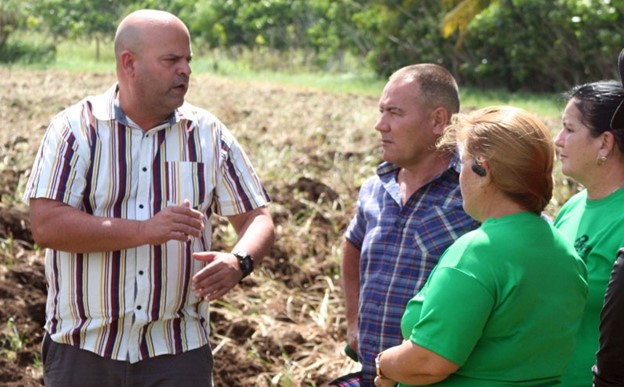
The official did not say where they could get the inputs of his detailed list, but he did recommend that his local subordinates “demand compliance”.
By 14ymedio
HAVANA TIMES – Escorted by a press team that could not be more loyal to him, the first secretary of the Communist Party of Villa Clara embarked on a journey to one of the great forgotten places of the province: Cifuentes. The tour – narrated in an almost evangelical tone by Vanguardia – describes Osnay Colina’s “edifying lessons” to the farmers, his diatribes against poor production and his “instructive demeanor,” an euphemism to describe his main objective: to scold.
Many people have left Cifuentes, immersed in the “geographical dispersion” and without resources to guarantee this year’s agricultural goals, of which Colina reminded them insistently. There was no lack of the photographs that Miguel Díaz-Canel has tried to popularize: those of the leader with two or three farmers, who hear from the mouth of a bureaucrat how to do their work.
In the newly founded Agricultural Industrial Company, which was granted 10,000 hectares, Colina gave his first scolding: 10% of the land suffers a “heavy infestation of marabou,” weeds and in the arable area only 72% of the government plan has been sown, in “imminent closure.” To top it off, the Company abounds in illegalities, which he asked to be “contained,” noting the stocks of milk and meat are plummeting.
Colina’s rigid face, his authoritarian gesture and his speech under the sun were highlighted by the newspaper photographer. Among his many utopian requests was “planting despite the limitations of inputs and technological packages, machinery, fuel, and the use of animal traction.” The leader did not say where the farmers could get the components of his detailed list, but he did recommend that his local subordinates “demand compliance.”
“A lot of food escapes to third parties,” he warned, alluding to Cifuentes’ illicit market. Colina asked to go to the farms to see “what happened” with the farmers who did not deliver what was due, and to help – although only “as far as possible” – those who do not comply with the State. To show his interest in the agreements between the producer and the Government, he had himself photographed reviewing the farmers’ contracts.
On paper was, precisely, what was agreed with the state purchasing company Acopio, said a delegate of the Ministry of Agriculture in Villa Clara during a meeting with Colina. Eighty-five percent of the farmers contracted did not fulfill their agreements or delivered a minimum production. “Where is the other part going? That’s what escapes to different destinations,” he argued.
Vanguardia newspaper insisted that Colina went on his tour “without many warnings to the parties involved,” a way of saying that no one, supposedly, had time to “put makeup on” Cifuentes’ terrible situation. The “instructions” of his trip are quantified in lessons: if the payments are delayed, it’s because the municipality is “old-fashioned” and ignores the bancarización [banking reform]; if the production is not going well it’s because the private farmers are murky in their management; if the money does not flow, it is because the farmers refuse to have tax accounts.
The situation is not exclusive to Cifuentes: only 21% of the farmers of Villa Clara, Colina complained, have a bank account, and about 200 markets – 23% – still do not have the means to make electronic payments.
Local leaders hoped an old pigsty converted into a “rustic milking shed” would impress Colina. It was a failure. While the official applauded the transformation of the premises, which now has 47 cows bought by the State, neither milk production is up to the annual State plan nor are the animals fed properly.
“And what about forage for the livestock?” asked Vanguardia. The answer: 13 hectares of cane and two of grass. Colina got angry again and said that improving the place was “critical. It has to change to achieve systematic improvements,” he said. The cows are “improving genetically, but they don’t have enough water, shade and, even less so, food.”
The worries that the newspaper’s story attributes to Colina have no end. The prose is not afraid to fall back on a kind of resentment toward the farmers who are making the leader suffer, and it asks questions that, like Colina, are also scolding: “Where are the sowing programs, with their respective seed banks? Of course they are null. That, along with the theft and illegal slaughter of livestock, impoverishment and deaths will be the order of the day if critical points are not corrected,” the report concludes.
With the fidelity of the Communist Party newspaper in Villa Clara – known for not departing one iota from orthodoxy or making space for excessive criticism – Colina practices a method that has given results to other colleagues, such as Livan Izquierdo: to be praised by the official press until the Government rewards him and “elevates” him to a post in Havana.
Translated by Regina Anavy for Translating Cuba.
Read more from Cuba here on Havana Times.




